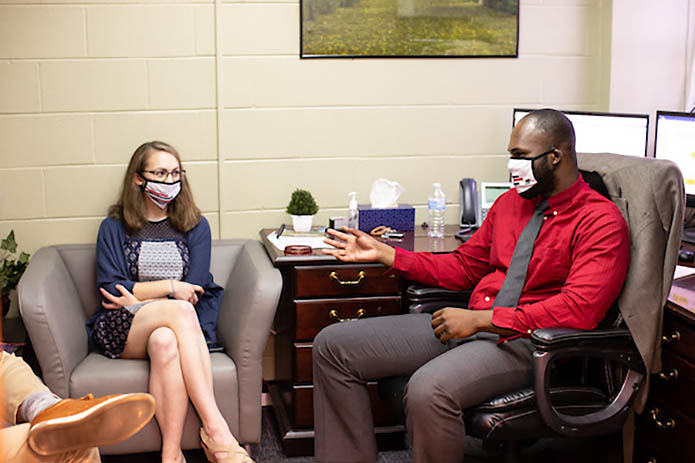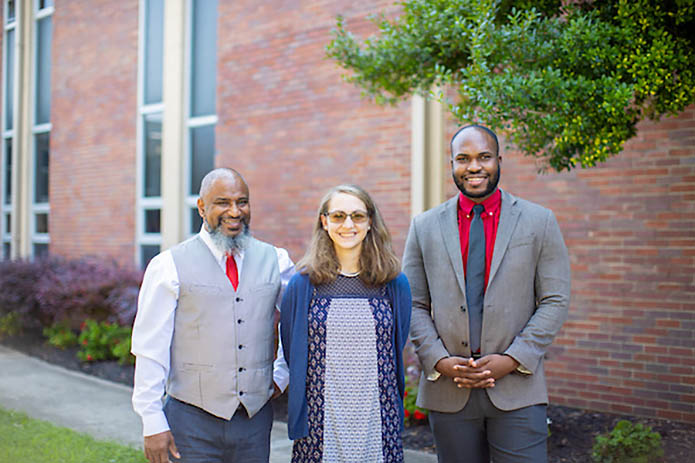 Clarksville, TN – In 2017, when Alayna Edwards was a high school senior living in Nashville, the idea of going to college made her a little nervous. As someone diagnosed with autism spectrum disorder, Edwards wondered how successful she would be taking classes on a University campus.
Clarksville, TN – In 2017, when Alayna Edwards was a high school senior living in Nashville, the idea of going to college made her a little nervous. As someone diagnosed with autism spectrum disorder, Edwards wondered how successful she would be taking classes on a University campus.
“Once I figured out what it was, every college that I looked at, I asked if they had something like this, and Austin Peay was the only one who had it,” she said. “That’s how I chose Austin Peay.”
Four years later, in May 2021, Edwards graduated with a degree in elementary education. She returned to campus this fall to pursue a graduate degree in curriculum instruction, and she credits her recent academic success to the FSL.
“I loved it,” she said. “In all honesty, I really think if I didn’t have it, I wouldn’t have gone to tutoring, I wouldn’t have survived college.”
Edwards liked the program so much, she’s also returning to its offices in the Claxton Building this fall as one of the program’s new graduate teaching assistants. Her story is just another example of the astounding success the FSL program has achieved since it was first unveiled at APSU in 2015. During the last academic year, six FSL students earned their degrees, and this fall, the program registered 33 students – a record number for the program.
“It is awesome to see these success stories,” Emmanuel Mejeun, FSL director, said. “We’re under of the College of Education, but students don’t have to be an Education major. In fact, most of our students are STEM majors or in the College of Arts and Letters. All APSU students need is the official diagnosis of autism, and we’ll be able to give them the support that we have.”
‘She helped me figure it out’
The FSL’s support structure includes special classes for freshmen and sophomores, focusing on how to succeed in college, and special classes for juniors and seniors, focusing on how to succeed in the professional workforce.
“Then we have peer mentors who help with the social aspect of college,” Mejeun said. “When they’re a junior, they no longer have a peer mentor – they have a faculty mentor. That mentor’s job is to help them find resources available to them within their field.”
That faculty mentor helped Edwards pick a master’s degrees program once she graduated from Austin Peay State University.
“She helped me figure it out,” she said. “She talked to me about it, researched it, and found out what works better.”
This summer, Mejeun contacted every place he could find in the state that serves individuals on the autism spectrum, letting them know about the program. The FSL has doubled in size since it first opened six years ago, and he’s hoping to continue that trend. To do that, the FSL now has its first coordinator on staff.
Don’t give up’

Edwards and Mejeun discuss her graduate teaching assistantship. (APSU)
For years, Alistair Gibbs-Francis worked as an intern and then graduate assistant in the FSL while earning his bachelor’s and master’s degree in social work. After graduating in May, he joined the staff to help Mejeun grow the already popular program. His life experience as an adult learner and former soldier gives him an added advantage when working with FSL students.
“I tell them, ‘don’t give up,’” he said. “My first college course, I took in 1986. I didn’t graduate with my bachelor’s until 2019. That’s a long time. In the middle, I had a whole career in the military, got out of the military and was like, ‘what should I do?’ I was a First Sergeant, which was basically taking care of a company of 140 soldiers roughly – it was social work without a license. It’s been a really eventful journey to get to this point. I’m really happy to be here and see the students progress.”
His office is on the other side of a cinderblock wall from Mejeun because the FSL uses most of its offices to provide students with both an academic environment and a student lounge. During the day, participants often hang out on the couches, socializing, or at a desk, studying.
“It’s a good thing that the FSL office suite is getting low on space, because it means that more students are taking advantage of our services,” Mejeun said.
“I really liked it here when I was in undergrad, but I didn’t talk much to other FSL students,” Edwards said. “Now I’m really engaged with them, talking to them, asking how they’re doing. Being on the other side of it now, I see how much work they put in to actually help us.”
That makes Mejeun smile, but he’s quick to point out that students like Edwards are the ones responsible for their successes.
“You’re not defined by your diagnosis,” he said. “You make choices and work hard and you’ll be successful. I’m proud of how she has succeeded, and I’m looking forward to seeing what else she accomplishes.”
Information on the program, such as admission requirements, services and resources, is available online at www.apsu.edu/full-spectrum-learning.



